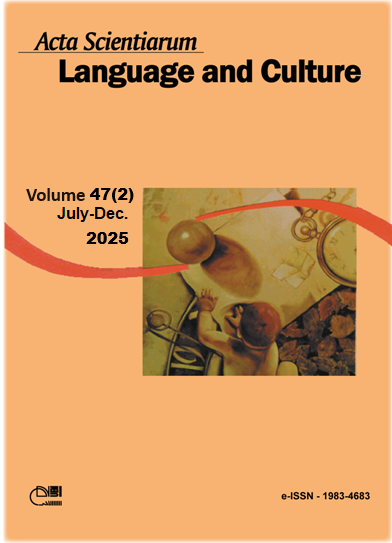Intersectionality of Patriarchy and Colonialism: A Postcolonial Ecofeminist Reading of Sahar Khalifeh’s The End of Spring
Resumen
This essay examines the postcolonial ecofeminist implications of The End of Spring (2008) by Sahar Khalifa, a Palestinian nationalist and feminist. Palestinian women are confronted with a dual burden of disabling discourses: the master narrative of the Israeli occupation and the masculine rhetoric of the colonized Palestinian man. The interpretations of the novel from a postcolonial ecofeminist perspective bolster the postcolonial ecofeminist argument that the Israeli exploitation and occupation of Palestinian land and the double oppression and marginalization of Palestinian women are intertwined within patriarchal and colonial systems. The treatise highlights the maternal and physical contributions made by women to Palestinian liberation and resistance project and how the masculinization of the Palestinian resistance obstructs the liberation project and hampers Palestinian nationalistic objectives. Khalifeh emphasizes the resistance of women against patriarchal and colonial forces in The End of Spring, as evidenced by the resolute perspectives of Umm Suad and Suad, her daughter. The participation of these two females in acts of resistance demonstrates that motherhood and the idea of a motherland, particularly in a struggle against patriarchal norms and colonialist power, are not anti-feminist but complementary and compatible with feminism.
Descargas
Citas
Amireh, A. (2003). Between complicity and subversion: body politics in palestinian national narrative. South Atlantic Quarterly, 102(4), 747-772. https://doi.org/10.1215/00382876-102-4-747
Angierski, K. N. (2014). Reclaiming the Motherland: (Eco)feminism in Sahar Khalifeh’s Inheritance and the End of Spring [Master’s Dissertation, State University of New York].
Ashcroft, B., Griffiths. G., & Helen, T. (2007). Post-colonial studies: the key concepts. Routledge.
Brammer, L. (1998). Ecofeminism, the environment, and social movements. Proceedings of the National Communication Association 1998 Convention. New York, NY.
Buell, L. (1995). The environmental imagination: thoreau, nature writing, and the formation of american culture. Harvard University Press.
Bulbeck, C. (1998). Re-orienting western feminisms: women's diversity in a postcolonial world. Cambridge University Press.
Cahill, A. J. (2001). Rethinking rape. Cornell University Press.
Cook, B. J. (2008). Women writing nature: A feminist view. Lexington Books.
Cooke, M. (1996). Women and the war story. University of California Press.
Gaard, G., & Murphy, P. D. (1998). Introduction. In G. Gaard & P. D. Murphy (Eds.), Ecofeminist literary criticism: Theory, interpretation, pedagogy (pp. 1–14). University of Illinois Press.
Ghanim, H. (2009). Poetics of disaster: nationalism, gender, and social change among palestinian poets in Israel after Nakba. International Journal of Politics, Culture, and Society, 22(1), 23-39. https://doi.org/10.1007/s10767-009-9049-9
Jaber, E. (2009, March 27). A provocative writer who challenges and ridicules authoritarians and calls for change. Sahar Khalifeh: my work is realist, from people, towards people [Interview]. Trans Sami Hanna. Assafir Cultural Supplement. http://www.assafir.com/Windows/ArticlePrintFriendly.aspx? EditionID= 1198&ChannelID=7090&WeeklyArticleID=54733.
Kaur, G. (2012). Postcolonial ecofeminism: women and land in Kamala Markandaya’s Nectar in a Sieve. International Journal of Humanities and Social Science, 2(21), 100-110.
Khader, J. (2007). Postnational ethics, postcolonial politics: Raimonda Tawil’s My Home, My prison. In N. A. Golley (Ed.), Arab women’s lives retold: exploring identity through writing (pp. 71-89). Syracuse University Press.
Khalifeh, S. (2008). The end of spring (P. Haydar, Trans.). Interlink Books.
Newman, L. (2005). Our common dwelling: Henry Thoreau, transcendentalism, and the class politics of nature. Palgrave Macmillan.
Ortner, S. B. (1974). Is female to male as nature is to culture? In M. Z. Rosaldo, & L. Lamphere (Eds.), Woman, culture, and society (pp. 68-87). Stanford University Press.
Priyanka, & Koudur, S. (2018). The multiple resistance strategies for survival under Israeli occupation in the novels of Sahar Khalifeh. Khazar Journal of Humanities and Social Sciences, 21(4), 18-35. https://doi.org/10.5782/2223-2621.2018.21.4.18
Rousseau, J. (2009). Rousseau on women, love, and family (C. Kelly, & E. Grace, Eds.). Dartmouth College Press.
Saadawi, N. E. (1980). The hidden face of eve: women in the arab world. Zed Books.
Slovic, S. (2013). Nature and the environment. Salem Press.
Weagel, D. (2009). Women and contemporary world literature: power, fragmentation, and metaphor. Peter Lang Publishing.
Weizman, E. (2006). Walking through walls: soldiers as architects in the Israeli-Palestinian conflict. Radical Philosophy, 136, 8-22.
Derechos de autor 2025 Rashed Daghamin

Esta obra está bajo licencia internacional Creative Commons Reconocimiento 4.0.
DECLARAÇÃO DE ORIGINALIDADE E DIREITOS AUTORAIS
Declaro que o presente artigo é original, não tendo sido submetido à publicação em qualquer outro periódico nacional ou internacional, quer seja em parte ou em sua totalidade.
Os direitos autorais pertencem exclusivamente aos autores. Os direitos de licenciamento utilizados pelo periódico é a licença Creative Commons Attribution 4.0 (CC BY 4.0): são permitidos o acompartilhamento (cópia e distribuição do material em qualqer meio ou formato) e adaptação (remix, transformação e criação de material a partir do conteúdo assim licenciado para quaisquer fins, inclusive comerciais.
Recomenda-se a leitura desse link para maiores informações sobre o tema: fornecimento de créditos e referências de forma correta, entre outros detalhes cruciais para uso adequado do material licenciado.




















6.png)









